Access #27 - Cedar Lake - August 13-20, 2009 Page One - Page Two - Page Three
![]() Rory Leidecker's Cedar-Nipissing-Nadine-Erables-Kioshkokwi-Little Cauchon Trip
Rory Leidecker's Cedar-Nipissing-Nadine-Erables-Kioshkokwi-Little Cauchon Trip
![]()
DAY ONE
Thursday, 1:00 AM - The trip began as we three loaded our gear into the Ford Expedition and set out for the Canadian border. A quick stop at a nearby Meijer's completed the gathering of supplies that would be needed for the next week. About an hour later, we were chatting with the Canadian border officer at the eastern end of the Blue Water Bridge. He asked more questions than I was used to, and ended by stating, "You guys must really like camping." I thought that was quite the understatement!
After a long drive, we arrived in Huntsville as the sun was coming up. We had to wait around for about an hour until Algonquin Outfitters opened. Chris issued us paddles and PFDs before loading the canoes on our truck and tying them down. He asked us about our route and wished us good luck. We hit the road for even more driving, which we were pretty tired of by then.
It was a long and uneventful drive to Cedar Lake. 12 hours after leaving home, we finally arrived at our access point. I was nearly insane with frustration after spending the whole morning in the truck. At last, the trip could begin! It was a beautiful summer day, with plenty of sun and only light clouds. We untied the canoes and pulled out our packs. We chatted briefly with a Canadian camper who noticed my cousin's Indiana license plate, then said goodbye and shoved off.
Cedar Lake was beautiful that day, and very calm for 1 PM. I had feared rough afternoon wind and waves, but there was nothing to cause alarm that day. Bryan paddled the Shearwater, while Brent and I were in the Prospector. In about an hour, we reached the far side of the lake, and began searching for the mouth of the Nipissing. We saw a couple entering the lake from the right general area, and decided to head in the direction they had come from. That was a mistake. We spent the next half-hour struggling through the marshy shallows just north of the river. We felt pretty ridiculous when we finally found the river and poled our canoes into the deeper water. I'll never make that mistake again!
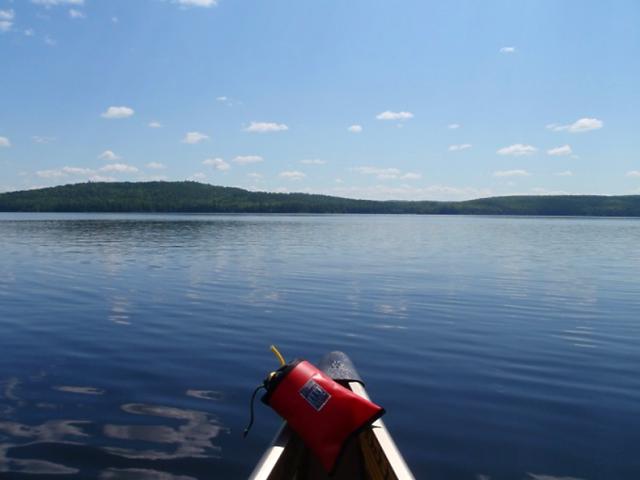
A beautiful day on Cedar Lake.
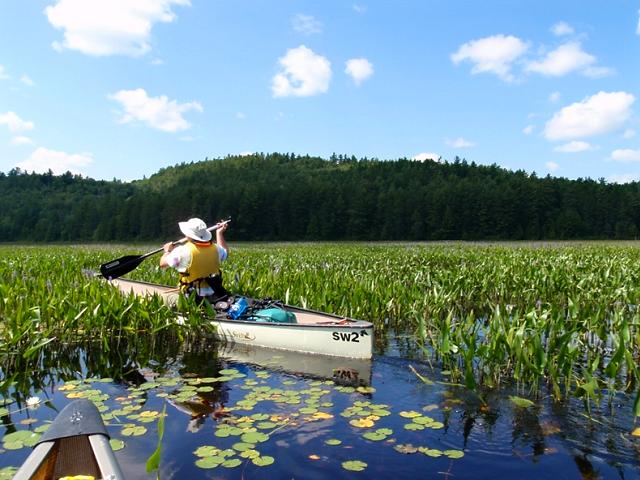
Lost in the marsh.
We came to the first portage of the trip, a 915m along the Nipissing River, around 3 PM. Here we established the routine that was followed for the trip on nearly every portage. Brent, carrying the heaviest pack, led the way to warn us of obstacles we might face. Bryan went next with his pack and the Shearwater. I came last with my pack and the Prospector. We wanted to see a big chunk of the park this week, and single carries helped us to cover more distance each day.
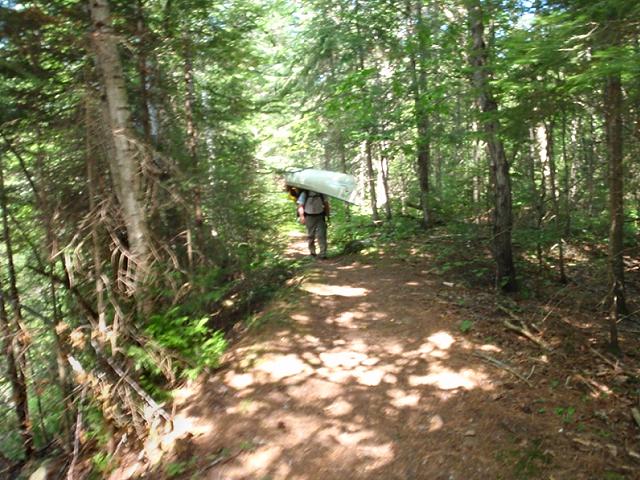
Bryan was a natural!
We came to a wide, shallow part of the river that was maybe 6 inches deep, probably less. Bryan was able to get the Shearwater past the obstacle to deeper waters, but Brent and I got stuck on the rocks. It became necessary for us to exit the canoe and line it past this impassable section. If the water had been even an inch higher, we probably would have been able to paddle through as Bryan had done. Instead, I soaked the bottoms of my boots while stumbling over hundreds of various-sized rocks.
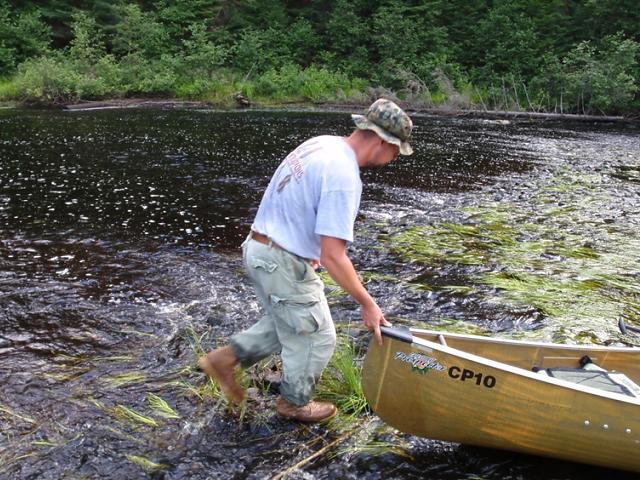
Lining the shallows.
The second portage, a 230m, presented no trouble. We unloaded, carried, and loaded in 10 minutes. Ahead of us lay a long stretch of river. It was great to be back in Algonquin again, but I had been awake for a long time that day! I caught myself drifting off while paddling stern during this time. My thoughts turned to finding a place to lay out the sleeping bag and settle in for the night.
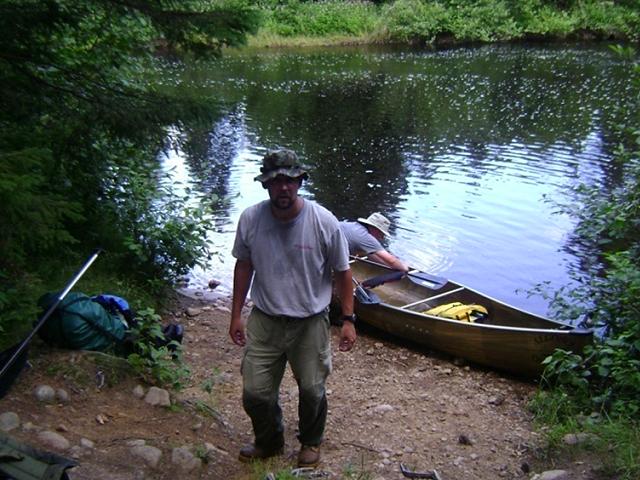
Brent secures the paddles as I prepare to don my pack.
The first site west of the 230m was nice, but not far enough upstream for us to stop for the day. We hoped there would be other nice sites to come. About an hour later we came to another "site", which was nothing more than an overgrown clearing with a hole in the ground for a fire pit. It was absolutely terrible, and even though it was around 5 PM and we were all dog-tired, we decided to press on. The third site we came to was good enough, so we made camp at 5:50 along the Nip at the Luckless portage site. I had planned on staying at one of the sites by the dam a little further upstream, but it became clear that we no longer had the enthusiasm to keep going.
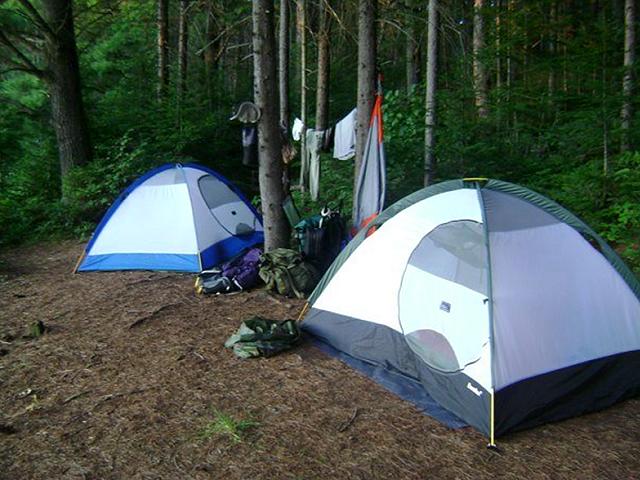
Our first site had a decent tenting area.
Bryan was not new to backpacking, but it was his first time to Algonquin. Brent and I reviewed the camp chores and everyone went to work. There had been plenty of time to discuss what needed to be done each evening (and then some), so a long instructional session was not needed. The tents were pitched, wet clothes hung on a line strung between a few trees.
Brent and I filtered water from the river, while Bryan started a fire in the small pit. I searched around the site and settled on a tree on which to hang the food bag. It was closer to camp than what I would have wanted, but there was a severe lack of suitable branches on all of the other trees within 50m of the campsite. We ate our dinner at 7:15, then stared at the fire as the sky darkened. At 8:45 we decided that it was time to turn in, so the fire was extinguished and sleeping bags were occupied.
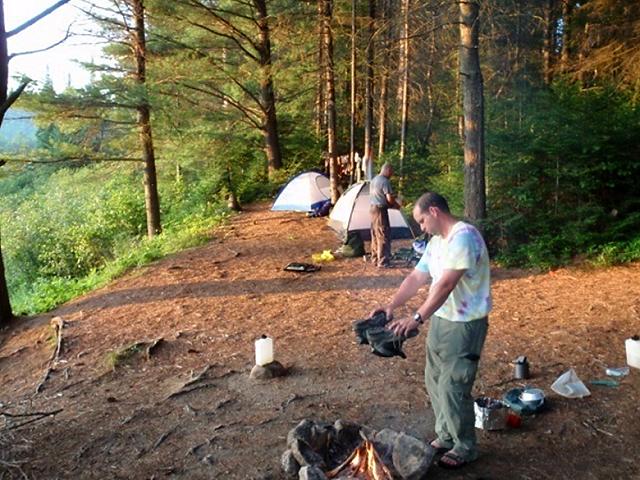
Bryan trying to dry his boots, Brent in the background.
DAY TWO
Friday, 6:15 AM - I awoke to a cool, misty morning. After putting on a fleece top and lined pants, I made my way out of the tent to see what Bryan was doing. He was busy with the stove, making ready to boil water for breakfast. Brent also emerged from the tent to watch the sun rising through the thick fog. We enjoyed our first breakfast of oatmeal and coffee, then set to packing everything for the day's travels.
We set out for the day at 8:30 AM, once again paddling upstream towards the portage to Nadine Lake. Bryan and I switched places in the canoes, so I was in the Shearwater. The first few hours were pleasant to paddle, and I enjoyed the independence of the solo craft. There were many twists and turns, mostly west, south, west, north, etc. with no eastern backtracking. The trees surrounding the river were high enough to block what little wind was around, so I only had to overcome the lazy current.
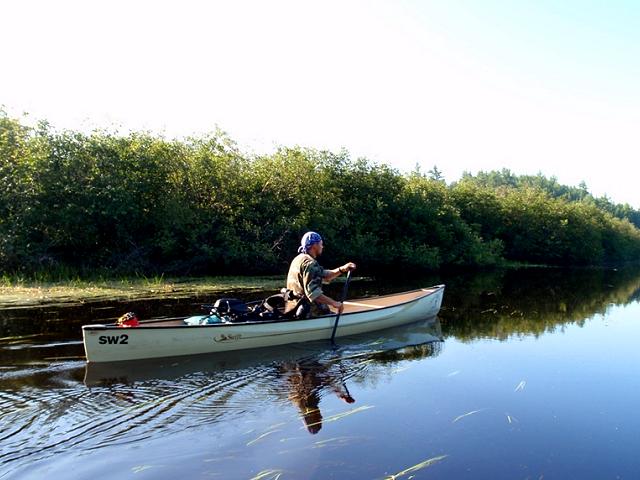
At 9:10 we arrived at the first portage of the day, a path that led around some beautiful rapids. We paused to take some pictures and just take in the beauty of the river. The campsite at the start of the trail was very small. Other than a nice view, it had little to offer. The fire pit was also full of garbage from previous campers. We wondered if the garbage had been left by the group we had passed the day before along the 915m portage. I guess we'll never know, and this would be just another example of people abusing the awesome privilege of exploring Algonquin Park. I completely missed the second campsite, which was situated off of the trail away from either end. Brent and Bryan told me that it looked much better than the site at the put-in.
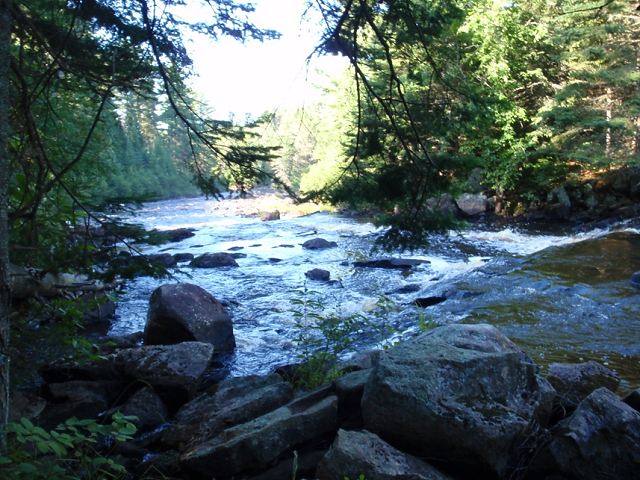
We were only out of the canoes for 15 minutes before loading up and setting off again. During this next stretch I "chased" a heron up the river for about a mile. Every time I came within 30m of the bird, it became nervous and flew off about 100-200m upstream. After a few times, I started talking to the bird, asking it questions like, "Why don't you fly off farther, or maybe the opposite direction? This river only gives me two ways to go, and I'm not going to turn around and head the other way!" Finally it landed in the reeds about 50m away from the bank of the river, and we were able to pass by without sending it airborne again. Soon after we passed two guys in a canoe and, noticing their camera, warned them of the heron they would soon come across. They had seen it flying from a distance, and hopefully our information helped them to get some close-up shots.
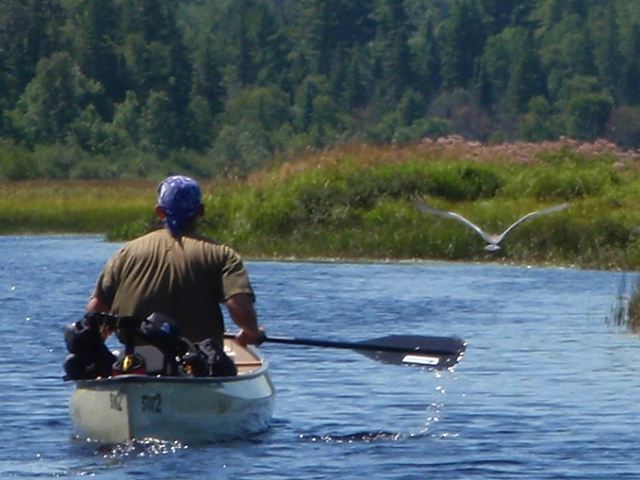
The heron takes off again as I get near.
We made the second portage at 10:00 AM, a 110m. We then came to the third one of the day at 10:30, a 365m. The river was wider for a stretch, with fewer twists and more east-west travel. I found myself traveling upstream and into a steady wind, much of the time. It took about an hour to get from the 365m portage to the next campsite along the river. Here we stopped for lunch and rest. My energy levels were pretty low at this point, due to several battles against the wind in the Shearwater. I ate a big lunch of PB&J on pita bread and as much trail mix as I could consume, in an attempt to replenish my strength. Bryan offered to switch places with me, but I declined the offer. The wind and current were giving me a challenge, but I hadn't been defeated yet. Knowing there was still a long stretch of river to paddle, we resumed our spots in the canoes just after noon.
During the morning, I had tried to use "j" strokes to propel and steer the solo canoe. With the strong wind in my face and fatigue sapping my endurance, I ditched the fancy strokes and opted for alternating strokes. This gave me the power necessary to progress against the wind and keep up with my comrades in the tandem canoe. I psyched myself up by yelling challenges to the wind. "Is that all you've got? Come on! Push me back!" Ahh, the freedom of speech that comes with the wilderness canoe trip! With my partners upwind of me, my taunts were heard only by the one person they were intended to motivate. The mind games kept me paddling, which became a total-body exercise over the next 2½ hours. When one muscle group became overly tired, I modified my paddling "technique" to use another muscle group more. I use the term "technique" very loosely, as my fatigue and desperation led to a very barbaric rhythm of 3 on one side, 2 on the next, or whatever combination kept me moving upstream.
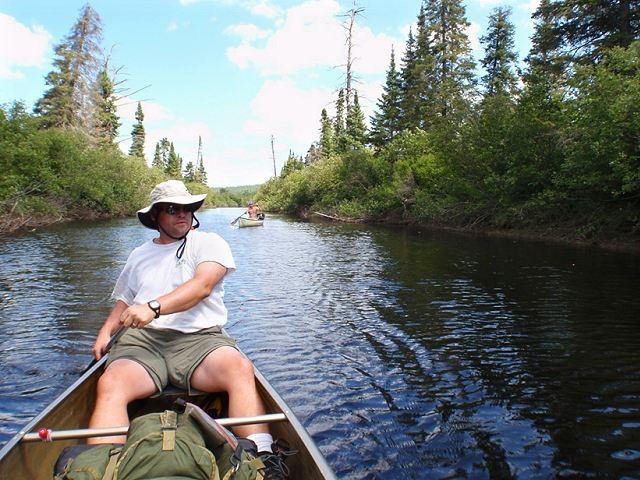
Nearing the portage to Nadine Lake.
Sometimes a scenic paddle turns into a challenge against nature. And, all one wants to see is the finish line, or in this case, the desired portage sign. At long last, Brent spotted the yellow marker, and yelled to me that I was almost there. I had barely used my legs all day, so I was confident that the portage to Nadine would be manageable. We set out at 2:30 PM in the same order that we had used on every portage so far. Brent took the lead, followed by Bryan, and I came last. I had consulted some fellow AAers while planning the route for this trip, and I believe it was Jeffrey McMurtrie who warned me about the elevation change along this trail. Not only was this trail uphill the whole way, it was 1410m long and the home of half of the mosquitoes contained in Algonquin Park!
Bryan set his mind to finishing the portage and trudged on at an impressive pace, passing Brent along the way. I'm not sure if he was just tired, or concerned about my condition, but I caught up to Brent somewhere near the middle of the trail. About 2/3 of the way down the trail, I set the Prospector down next to the trail and swallowed my pride. My upper body could not take the weight of both pack and canoe any longer. I finished the trail with my pack, fished out a mosquito net for my head, applied more bug spray, and set out to retrieve the canoe. Bryan rested at the end of the trail while Brent took the solo canoe to scout the four sites on Nadine Lake. When I returned with the Prospector, Bryan and I loaded the remaining packs and paddled across the lake to the site Brent had by then selected. An hour after starting the hellish portage to Nadine, we were unloading the canoes at our home for the next 17 hours.
We had our pick of the campsites on Nadine, and Brent definitely picked a good one. This site had good tenting areas, a great fire pit, a beautiful view of the lake, and a gradually-sloping rock waterfront. One of the first things we did was wash the last two days' clothes. It was warm and sunny, and we wanted to use that to dry our clothes as fully as possible. Clothes-washing was nothing more than dunking the smelly items in the lake a few times and wringing as much filth from them as we could. No soaps or detergents to pollute the lake, just the funky sweaty aroma and some bug repellent. As long as nobody smelled so bad as to induce vomiting by the other members of the group, we didn't care how we smelled.
After doing the laundry, we donned our swimsuits to rinse our bodies off. Bryan dove quite boldly into the lake and swam about for quite some time. I was a bit more conservative with my bathing, as I have been ever since slicing a toe on a sharp rock many years ago. Brent and Bryan strung up their hammocks next and relaxed by the shore, while I sat on the ground in a padded camping seat. I really could have used my own hammock on this trip. Brent was gracious enough to let me try his hammock for a while. He and Bryan replenished our water supply while I enjoyed the view of the blue sky from the hammock. I felt the urge to do something useful, so I took the rope and hung the food line, this time much further from the campsite.
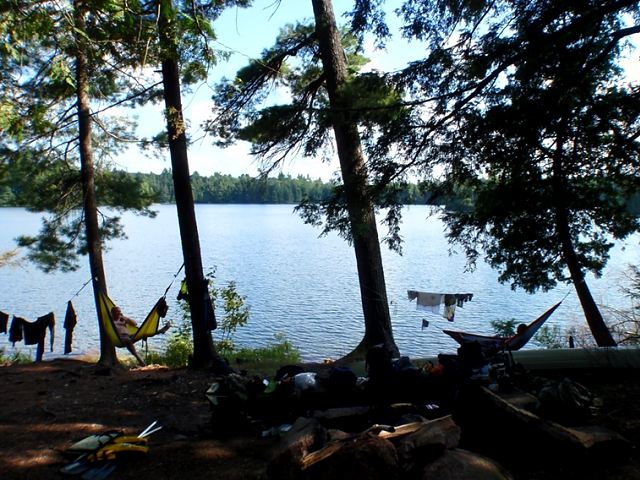
Brent and Bryan enjoy a relaxing afternoon after a long day on the Nipissing.
Soon after I returned, Bryan or Brent began preparing dinner. Somehow, I failed to prepare a single meal during the trip. I cleaned many dishes and completed various other camp chores, but no cooking. Nobody seemed to care and we never missed a meal, so it wasn't a big deal. We had beef stroganoff that night, and it tasted remarkable. We also continued to eat trail mix, as we had brought more than enough for the three of us. After dinner, we noticed a family of loons out on the lake. The two parents had a baby in tow, and they entertained us with their calls into the night. I was completely wiped out by sundown, so I took a few Tylenol with a Kahlua chaser before heading off to bed. It was another early night, shortly after 8:30 PM, for we knew another tough day would meet us in the morning.
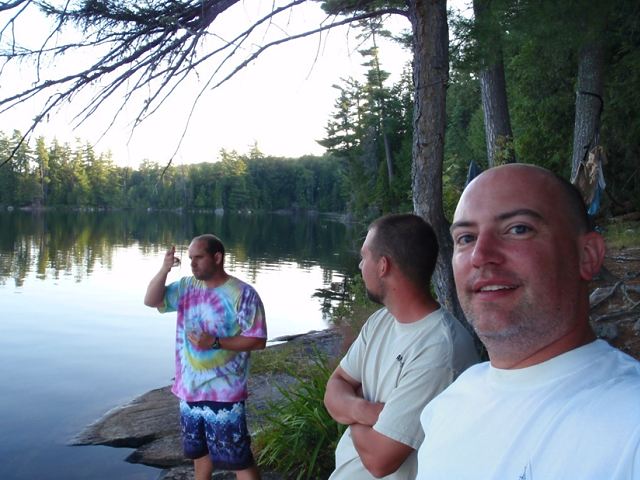
Enjoying the view from shore.
DAY THREE
Saturday, 6 A.M. - I woke up sore from the previous day's paddle against wind and river current. I was also in a little pain as a consequence of deciding to not apply sunscreen on a very sunny day. I knew that this was going to be a long, tough day, so I was quick to take some Tylenol with my morning oatmeal and coffee. Brent and Bryan were up and about around the same time, and we all waited for the sun to come up over the eastern hills. The family of loons showed up again and serenaded our breakfast.
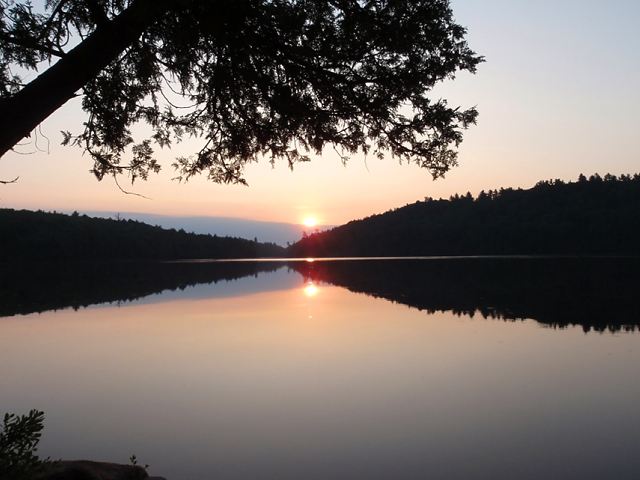
Sunrise on Nadine.
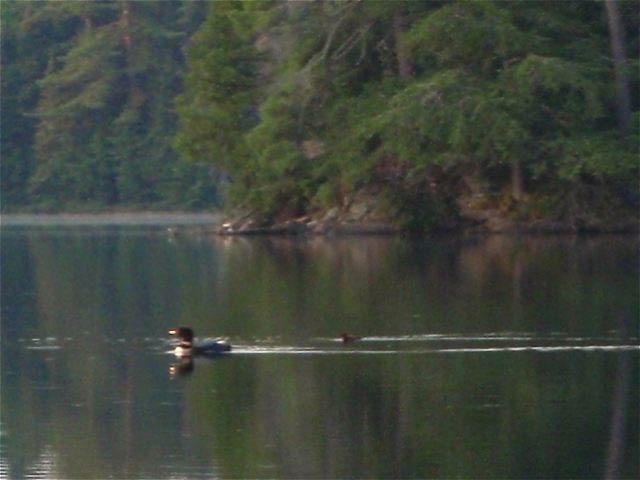
Loon with baby.
It was much warmer than we had expected, and compared to what we had experienced the day before. The mosquitoes became active early, so we were motivated to get packed up and moving. By 8:30 we were on the water and headed for the first portage of the day, the longest one of the trip. I had learned before the trip that the hill on this trail was one of the highest elevations in the Park, and afforded a great view all the way to Erables Lake. Well, we did not stop to take in the view, or even to sample the fresh spring water from the pipe near the canoe rest. We were all business, which is to say moving forward, one foot in front of the other until we reached the shore of Osler Lake. It took us almost an hour to traverse that trail, and that was only one trip! That 1830m portage is not to be taken lightly, and we were all glad that we saved it for the beginning of day three, instead of attempting to tackle it at the end of day two.
I had felt a little angry at myself for failing to complete the 1410m to Nadine in one carry the day before, but I felt redeemed when I set the canoe down at the end of the 1830m. I felt confident and ready to tackle the remaining portages before us, but I was still a little apprehensive about "Heart Attack Hill" that we would have to negotiate in a few hours. It took us about half an hour to paddle across Osler to the other portage.
We tackled the portage to Little Osler in about half an hour. Arriving at the lake last as usual, I was surprised to see three canoes and nine teenage girls at the put-in. They were going in the opposite direction, and a few of the girls hit the trail as the rest pulled the canoes ashore. We offered our assistance, but they really didn't need it. We chatted a bit, and they said they were on day ten of a fifteen day trip. Wow! They were from Camp Tamakwa, and had already traveled from Tea Lake to Cedar Lake and Kioshkokwi, and were making their way back to the camp. We found out that several of the girls were from Michigan, not too far from me and Bryan. I commented that I hoped my girls would be as tough as them when they were older, and maybe I would send them to Camp Tamakwa! It was clear that they had been in the Park for a while as they helped each other get ready to hit the trail. With practiced ease, packs and canoes were lifted and carried through the woods towards the next lake. We were thoroughly impressed and humbled as we boarded our Kevlar canoes.
Once out on the water of Little Osler, we took some time to refill the canteens and eat several handfuls of GORP (trail mix). Bryan's wife had mixed up the best GORP I have ever eaten, so I felt compelled to eat as much of it as I could! Besides, we had burned a lot of calories on the first two portages already, and there were more to come. With full canteens and stomachs, we resumed paddling towards the next portage. Bryan was in the solo canoe this day, and a loon decided that he was trespassing on its lake. It loudly called out to us, despite our lack of understanding what it wanted us to do. I had never been squawked at by a loon, so it ended up being quite entertaining.
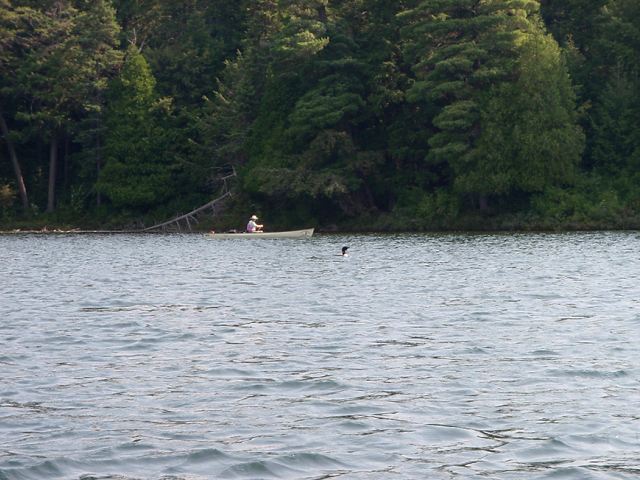
A vocal loon swimming between our canoes.
We reached the put-in of the dreaded "Heart Attack Hill" at 10:50. We reminded each other that the girls from Camp Tamakwa had recently done this portage going uphill, so it shouldn't be that tough for us. Well, we made it to the other side in about half an hour without incident, but it was clear that this portage was aptly named. The whole thing was downhill for us, but at a very steep angle the whole way. I was happy to carefully place my feet to descend the long hill instead of try to climb it like a mountain goat.
All that work, to find Little Nadine Lake (or pond, more accurately). We didn't bother timing the crossing to the next portage, as it was only a few hundred meters across at most. By noon we had finished the next portage, a 450m to Skuce Lake. This was my second visit to Skuce, as I had stayed here on my very first Algonquin trip in 1995. We were pretty tired by this time, so we took a nice, leisurely lunch and rest stop at the western site for an hour. We spotted a couple as they emerged from the portage to Maple Creek, but they must have stopped for lunch as well, eating at the put-in. We could not see them from the campsite until they paddled past in the opposite direction we were taking. We took time after lunch to put moleskin and tape on our feet where needed. There were still a few miles of water and trail to cover, so we forced our aching bodies back into the canoes.
By 1:20 P.M. we were buckling the belts of our packs and placing canoe yokes upon our shoulders again. Another walk through the woods brought us to Maple Creek. We were happy to be paddling downstream for the first time, and the ease of travel was quite a relief. That lasted for about 50m until we came to a beaver dam. Thanks, beavers!
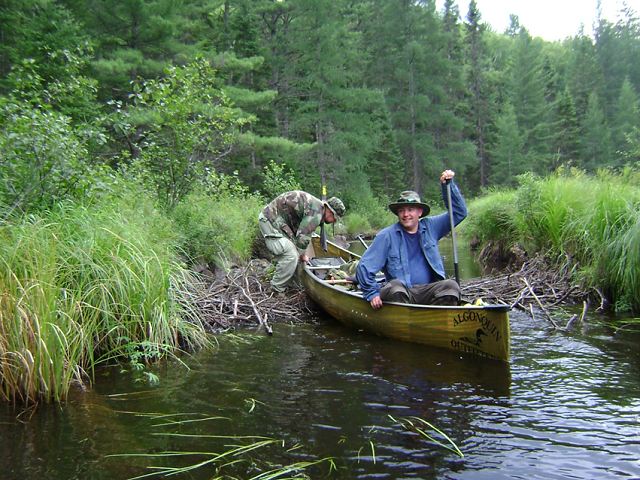
You can actually see the portage sign from the beaver dam.
We arrived at the 90m portage at 2:00. It was just a short hop around a rocky stretch, so we decided to double carry. It was nice to carry just a pack and have a full field of vision for once. The sound of the water rushing over and around the rocks added to the enjoyment of the moment. It was no problem to jog back to the take-out to retrieve the canoes. Overall, a portage that short can be double-carried without losing much time. Bryan and I agreed that it was a good spot to enjoy the scenery.
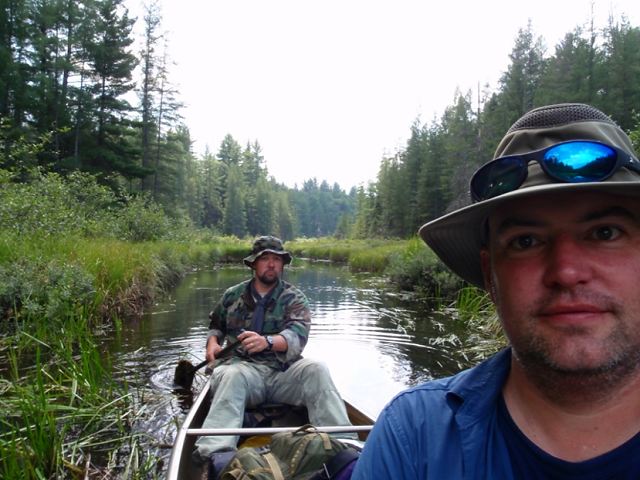
Paddling Maple Creek.
Another short paddle downstream brought us to the last portage of the day, a 660m. We had renewed enthusiasm and looked forward to the search for a good campsite. The single trip over the portage seemed effortless, either because of our renewed enthusiasm or numbness from the pain of six previous portages that day. Maple Creek emptied into Erables Lake, in a sheltered bay that was almost a lake of its own. It was difficult to see the narrow strait that led to the main body of the lake, but eventually we found it and passed through.
The first sites we considered were on the southern island, but a quick look in their direction showed they were already occupied. My next thought was to try the site I had stayed at in 1997, but first we checked a site on the way. We didn't care for the first site, and Bryan really didn't like the second either. We gazed across the lake towards the next possible site, and the first twinge of infatuation pulled at our hearts. A prominent rock landing caught our attention, and we instantly hoped that there were no canoes or tents hidden somewhere on that site. The wind had picked up as Brent and I raced across Erables to claim the beautiful site before anyone else might. Bryan did his best to follow us despite the strong wind.
The site was just as attractive close up as it seemed from across the lake, perhaps even more so. In addition to the great rock landing, this site had a great fire pit/bench area and three level tent pads. The site was located on the end of a peninsula, so we had views of the water on three sides. There was just enough tree cover to provide shade and protection from strong winds, but enough exposure to allow sunbathing, cooling breezes, and clothes drying.
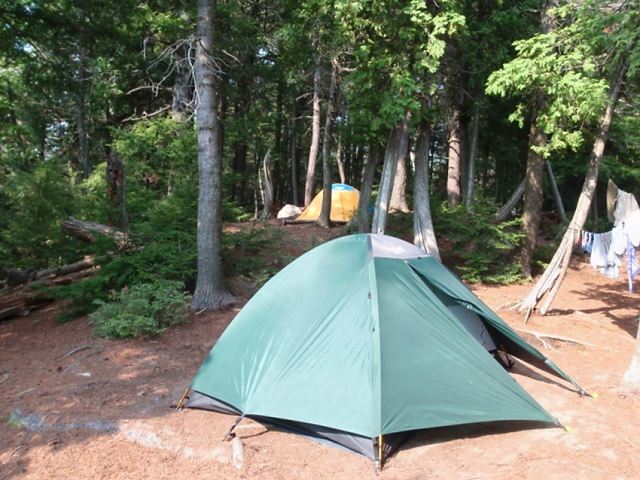
A view of the campsite facing in.
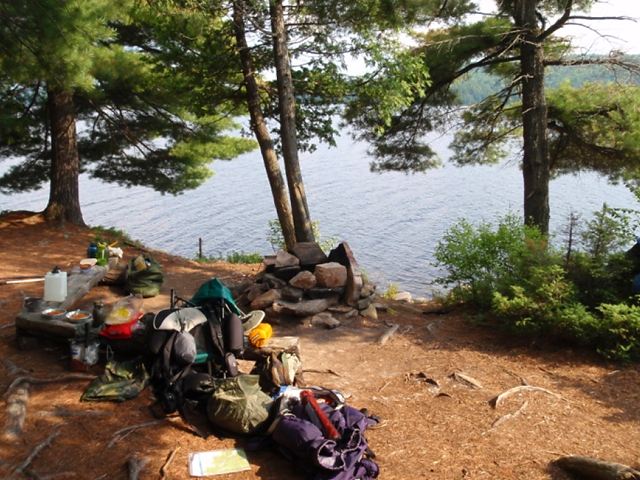
A view of the site facing out to the lake.
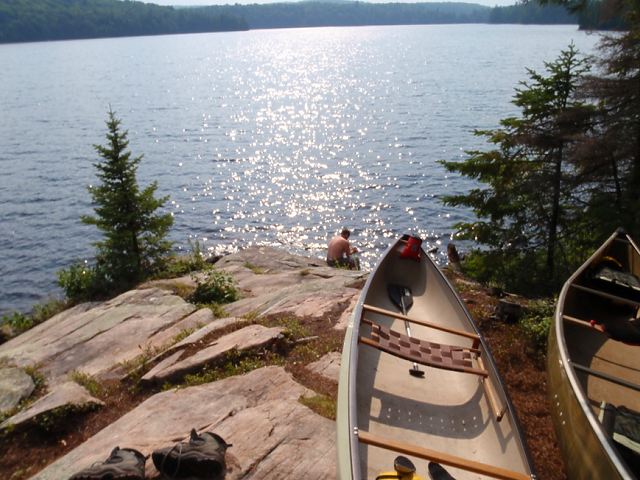
Bryan on the rock landing.
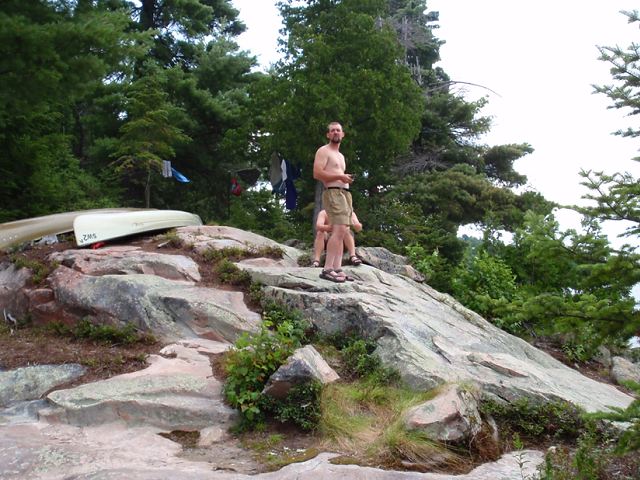
View of the rock landing from water's edge.

Brent found a natural recliner at the water's edge, which was great for filtering water and stargazing.
A previous camper had cut down a pine sapling, and Bryan felt compelled to add the brown tree to the fire. The result was this temporary blaze, possibly "Guncho-approved". Fortunately, the height of the flames returned to a reasonable height within a few seconds.
Supper was prepared and eaten by 5 P.M., then we waited for the clouds to open up to provide enough sun for comfortable swimming. The break we were hoping for did not come, rather the clouds continued to get darker. Light sprinkling rain fell from 6 to 6:30. We spent the next few hours sitting around the fire or looking out across the lake from the rock landing. Around 9 PM, we gave up waiting for clear skies and turned in. We heard light rain on the fly off and on throughout the night.
Page One - Page Two - Page Three